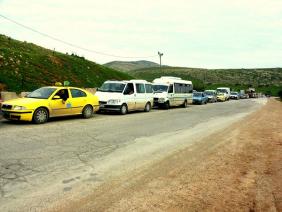Tayasir
 About 30 cars waiting east of the Hamra checkpoint. Z. reported the line remained for three hours after we left at 15:30.
About 30 cars waiting east of the Hamra checkpoint. Z. reported the line remained for three hours after we left at 15:30.The army uprooted a young olive grove belonging to a resident of Tayasir in Area A (under Palestinian control). It’s not clear why.
A Canadian organization provides veterinary services to Bedouin in the Jordan Valley, in Area C, which is under Israeli authority.
From Highway 5 west of Brukin we saw two large areas on the hillside south of the road that had been exposed and graded in preparation for something. Do they intend to build? We also saw new construction in the Barkan industrial zone, to the left of Highway 5.
09:55 Za’tara/Tapuach junction
Three soldiers stand on the road to Jerusalem.
10:30 Hamra checkpoint.
One of the two lanes going through the checkpoint is blocked. Now only one car can go through at a time, from either direction. Since traffic is light anyway it’s not clear why they closed one lane. We’ll see the result when we return.
Soldiers are exercising on the road to Halat Makhoul.
We visited the K. family who lives north of the Kfir brigade headquarters. Military exercises are regularly conducted across from their encampment, including with live ammunition. We have witnessed it in the past. We met a veterinarian who works with Oxfam’s Canadian branch. He’s come for a regular inspection of the flock. Aren’t veterinary services part of the sovereign’s responsibility in Area C – that is, Israel? Not to mention the fact that disease doesn’t recognize borders. Must Israel receive handouts from Canada?
The Bedouin, who don’t have running water like the neighboring settlements, must buy water from Mekorot, the Israeli water company, in Bardala, and transport it in tanks to where they live. The water for personal use and in particular for the livestock costs the Bedouin NIS 8/cubic meter (in addition to transportation cost). The settlements receive very generous water allocations for agriculture, directly to the fields, at NIS 3/cubic meter.
12:30 Tayasir checkpoint.
When we arrived we found two drivers being detained, one coming from the east, one from the west. They were released after a while. One had been detained for half an hour because his ID appeared in the computer with a note. The soldiers (one of whom is an officer) telephoned their commander for instructions regarding what to do with him. They invited us to the checkpoint, but when we arrived they were busy with an exercise someone was running over the phone (and was watching, they said, from a distance), and it took too long, so we left. Maybe we have missed an interesting conversation.
K. told us about a resident of Tayasir (a town in Area A in the Palestinian Authority) who bought about 20 dunums of land from another Palestinian, fenced them and planted olive seedlings. Previously wheat had been grown there, without irrigation. The army demolished the fence and uprooted the seedlings. He has no idea why. He apparently contacted an attorney. To the best of our knowledge, the case might take years. For example, the Ro’i settlement took over a fairly large plot of land (10-20 dunums) beyond the road, and planted it with grapes. The land belongs to a Palestinian from Tubas, who went to court. Meanwhile the vineyard has flourished and they fenced it, and this year covered it with a greenhouse. I contacted Yesh Din to see whether they can help him.
15:10 Hamra checkpoint (on our way back)
About 30 cars wait on the east side, and it’s impossible to see how many are waiting on the west side. This is the time when laborers return from work. We were told they’ve been waiting an hour. The lane which has been blocked earlier is still blocked. At this hour there are usually no more than 7-8 cars waiting.
Three soldiers approach us and explain there’d been an alert, which was why one lane was blocked. The conversation was brief, fortunately, because while they were speaking with us the crossing stopped. Although inspections were very quick, more cars kept coming and the soldiers couldn’t keep up. Only three soldiers conducted inspections. Why don’t they add personnel at rush hour? We waited about half an hour and when we left the line had shortened only slightly. More than twenty cars still waited from the east.
This morning Z. reported on our Facebook page that the unusual line lasted for three more hours after we left and ended only about 6 PM. He included photos. Analin telephoned and said she’d received on Facebook photos from the Hamra checkpoint that were taken by Z. after we left (at about 15:30), some after dark (at 18:00, at least). He also found the long, unusual line at this checkpoint. He said hundreds of cars waited in both directions and crossed without inspection. He believes it was collective punishment, but it isn’t clear why.
Barkan junction
Two military vehicles on the rise above the junction; soldiers observing.
16:30 Shomron crossing
An ambulance from Yarkon district and two police minivans enter from Israel. Something must have happened.
